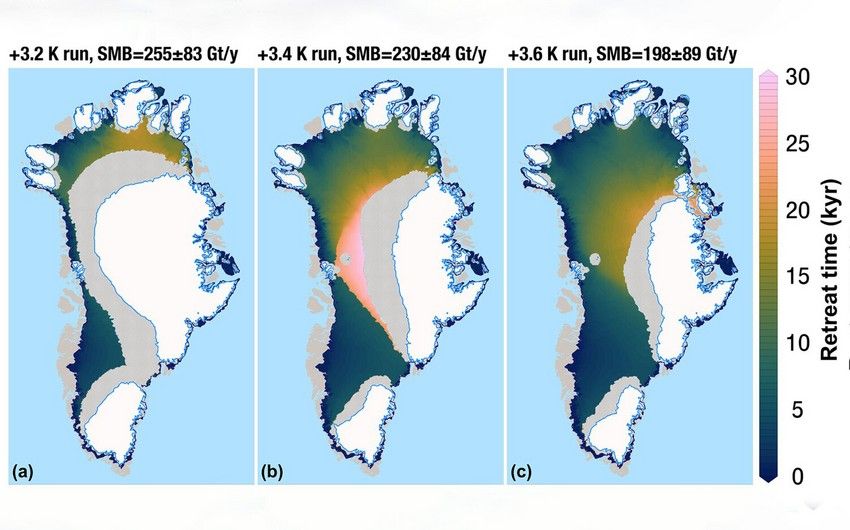Melting of Greenland's glaciers accelerates sixfold in 10 years

By Alimat Aliyeva
The Greenland Ice Sheet, the largest freshwater reservoir in the Northern Hemisphere, is losing mass at an unprecedented rate. Since the 1980s, it has already lost more than a trillion tons of ice, and in the past decade, the melting rate has increased sixfold, Azernews reports.
Experts have found that a loss of around 230 billion tons of ice per year will be a critical turning point. This corresponds to a global average temperature rise of 3.4°C. As of 2024, the planet has already surpassed the 1.5°C threshold set by the Paris Agreement, heightening concerns about irreversible environmental consequences.
Scientists used advanced simulations to estimate the impact of climate change on the mass balance of the ice sheet. They discovered that altitude and topography are key factors in this process: the ice retreats, leaving only the ice caps at higher elevations. A crucial area of concern is the western part of the ice sheet, which has the potential to stabilize the ice mass. However, if this region loses its connection to coastal areas, it could lead to the loss of over 80% of the ice mass.
The melting of the ice sheet has a range of devastating effects. In addition to rising sea levels, it causes changes in ocean salinity, threatening marine ecosystems, fisheries, and coastal communities. The complete melting of the Greenland Ice Sheet could lead to a rise in sea levels by as much as seven meters, which would significantly alter coastlines and impact millions of people globally. Furthermore, as the ice melts, it may release methane—a potent greenhouse gas—trapped in the ice, accelerating global warming even further.
In addition to its impact on sea levels, the loss of the Greenland Ice Sheet will likely disrupt global weather patterns. The influx of freshwater into the North Atlantic could weaken the Atlantic Meridional Overturning Circulation (AMOC), a system of ocean currents that plays a crucial role in regulating the Earth's climate. A slowdown of the AMOC could lead to colder conditions in parts of Europe and North America, as well as more extreme weather events worldwide.
Here we are to serve you with news right now. It does not cost much, but worth your attention.
Choose to support open, independent, quality journalism and subscribe on a monthly basis.
By subscribing to our online newspaper, you can have full digital access to all news, analysis, and much more.
You can also follow AzerNEWS on Twitter @AzerNewsAz or Facebook @AzerNewsNewspaper
Thank you!
